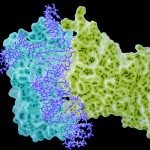Lien vers Pubmed [PMID] – 22961200
J Comput Chem 2013 Jan;34(2):132-40
Replica-exchange is a powerful simulation method for sampling the basins of a rugged energy landscape. The replica-exchange method’s sampling is efficient because it allows replicas to perform round trips in temperature space, thereby visiting both low and high temperatures in the same simulation. However, replicas have a diffusive walk in temperature space, and the round trip rate decreases significantly with the system size. These drawbacks make convergence of the simulation even more difficult than it already is when bigger systems are tackled. Here, we present a simple modification of the exchange method. In this method, one of the replicas steadily raises or lowers its temperature. We tested the convective replica-exchange method on three systems of varying complexity: the alanine dipeptide in implicit solvent, the GB1 β-hairpin in explicit solvent and the Aβ(25-35) homotrimer in a coarse grained representation. For the highly frustrated Aβ(25-35) homotrimer, the proposed “convective” replica-exchange method is twice as fast as the standard method. It discovered 24 out of 27 free-energy basins in less than 500 ns. It also prevented the formation of groups of replicas that usually form on either side of an exchange bottleneck, leading to a more efficient sampling of new energy basins than in the standard method.
